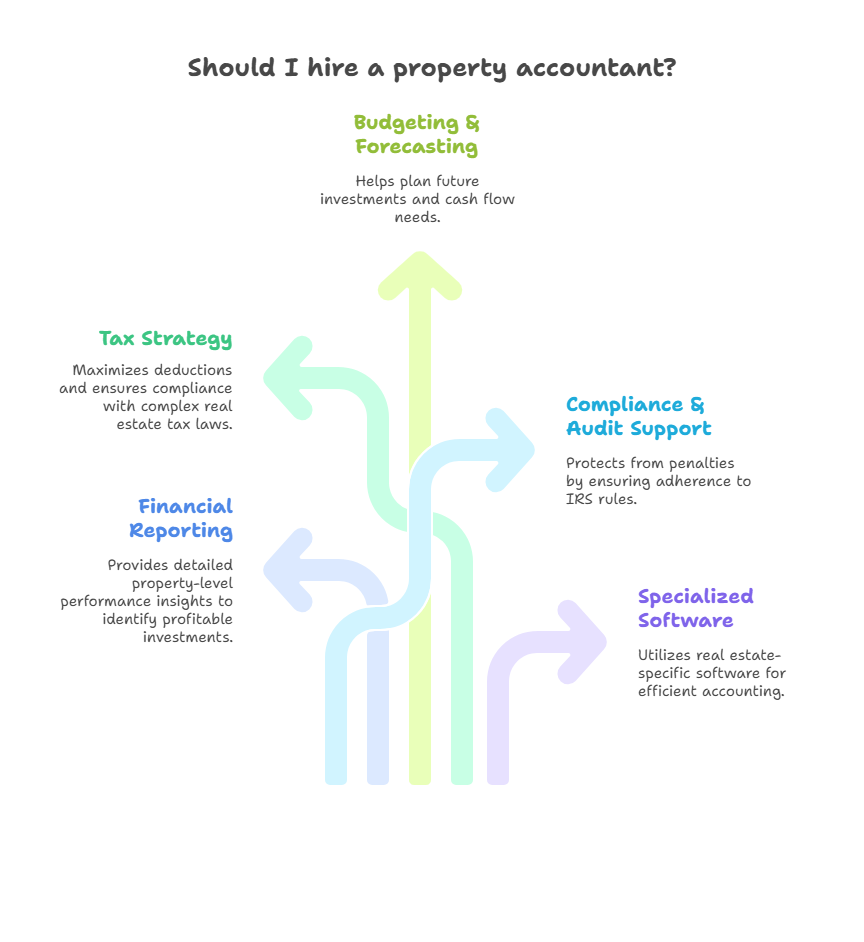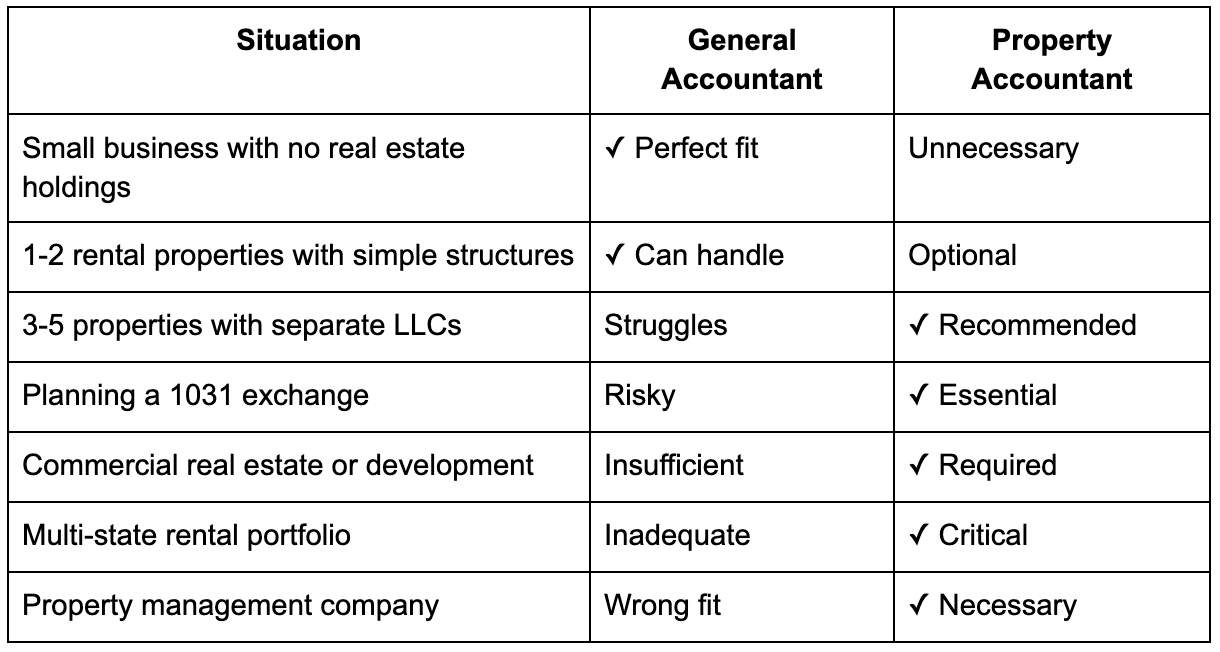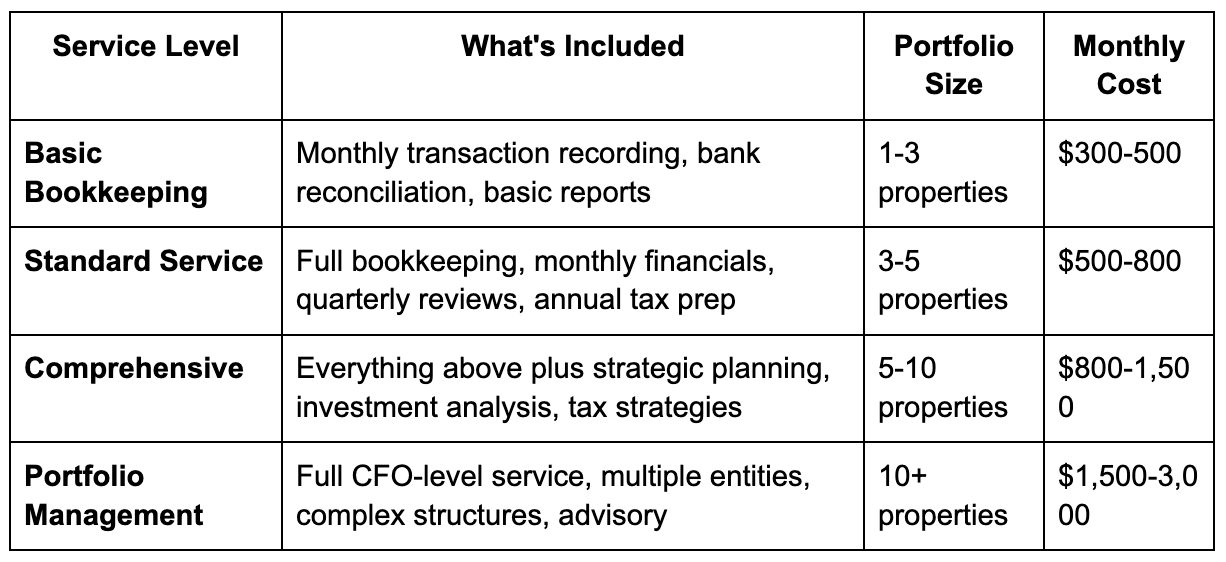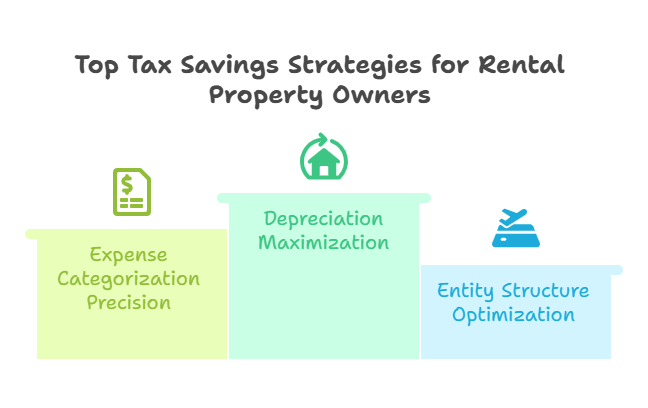Your rental property portfolio just hit five units, and tax season is approaching fast. You're juggling depreciation schedules, 1031 exchanges, and capital gains calculations across multiple LLCs while wondering if you're leaving money on the table. The answer is probably yes, and that's exactly why property accountants exist.
A property accountant is a specialized financial professional who manages all accounting and tax matters for real estate investors, developers, and property managers. Unlike general accountants, they focus exclusively on real estate transactions, rental income tracking, property tax compliance, and investment analysis. Most real estate investors working with property accountants save between $12,000 and $18,000 annually through better tax planning, optimized depreciation strategies, and avoided compliance penalties.
In this guide, you'll discover what property accountants actually do, how they differ from regular CPAs, when you need one, and how to choose the right specialist for your real estate business.

Property accountants handle the unique financial challenges that come with owning, managing, and investing in real estate. Their work goes far beyond basic bookkeeping, they're strategic partners who help maximize your returns while keeping you compliant with complex real estate tax laws.
Financial reporting and analysis sits at the core of their responsibilities. They prepare monthly, quarterly, and annual financial statements for each property in your portfolio. This includes profit and loss statements by property, balance sheets, cash flow reports, and rental income tracking. The key difference from general accounting? They understand how to track property-level performance so you can identify which investments are winners and which are draining cash.
Tax preparation and strategy is where property accountants truly earn their keep. They handle rental property tax returns, calculate depreciation schedules using cost segregation when beneficial, manage 1031 exchange documentation, and identify every legitimate deduction specific to real estate, mortgage interest, property taxes, repairs, maintenance, insurance, property management fees, and travel expenses to visit properties.
Budgeting and forecasting helps you plan for future investments. Property accountants create operating budgets for each property, forecast cash flow needs, analyze potential acquisition targets, and model different financing scenarios. They can tell you exactly how much cash you'll need for your next down payment and whether a property will be profitable before you buy it.
Compliance and audit support protects you from costly penalties. They ensure you're following IRS rules for rental properties, handle self-assessment requirements for non-resident landlords, prepare documentation for potential audits, and stay current on changing real estate tax regulations. When you're managing multiple properties across different states or countries, compliance gets complicated fast, property accountants navigate this complexity daily.
Property-specific accounting systems require expertise with specialized software. Most property accountants are proficient in platforms like Yardi, AppFolio, MRI Software, and Zoho, tools designed specifically for real estate that general accountants rarely use. They set up your chart of accounts properly from day one, categorize transactions correctly, and generate reports that actually help you make decisions.
The biggest value? Property accountants speak real estate. They understand concepts like net operating income, capitalization rates, cash-on-cash returns, and gross rent multipliers. When you ask whether adding a property manager is worth the cost, they can run the numbers and give you a data-backed answer in minutes.
At first glance, all accountants seem similar, they crunch numbers, file taxes, and produce financial statements. But the difference between a general accountant and a property accountant is like the difference between a general practitioner and a heart surgeon. Both are doctors, but you want the specialist when you need heart surgery.
Specialization depth is the fundamental difference. Regular accountants handle diverse clients across various industries. Property accountants focus exclusively on real estate, which means they've seen every situation you're likely to encounter, converting a primary residence to a rental, handling tenant damage claims, structuring multi-property LLCs, or navigating rental losses with passive activity limitations.
Tax code expertise separates the specialists from generalists. Real estate has its own universe of tax rules that most general accountants only touch occasionally. Property accountants live in this world daily. They know how to maximize depreciation using cost segregation studies, understand the qualified business income deduction for rental properties, can guide you through 1031 exchanges without triggering taxable events, and know exactly which repairs are immediately deductible versus which must be capitalized.
Software proficiency matters more than most investors realize. General accountants typically use QuickBooks or Xero. Property accountants work with industry-specific platforms like Yardi or Buildium that track unit-level data, lease terms, tenant ledgers, and CAM reconciliations. This specialized knowledge ensures your books are set up correctly from the start, not shoehorned into generic accounting software.
Industry connections provide added value. Established property accountants have relationships with commercial lenders, property management companies, real estate attorneys, and other investors. Need a referral for a property manager? They've got three recommendations. Looking for financing on your next acquisition? They can connect you with lenders who understand your portfolio.
Here's a practical comparison showing when you need each type of professional:

The cost difference isn't dramatic, property accountants typically charge $150-300 per hour compared to $100-200 for general accountants. For monthly services handling 3-5 properties, expect $500-800 monthly from a property specialist versus $300-500 from a generalist. The specialist's fee pays for itself through better tax strategies and avoided mistakes.
Many successful real estate investors work with both: a property accountant handles their rental portfolio, while a general CPA manages their other business income. This hybrid approach ensures each professional operates in their area of expertise.
Knowing when to bring in a property accountant can save you thousands in taxes and prevent costly mistakes. The trigger points are clearer than most investors think, and waiting too long usually costs more than hiring early.
The three-property threshold is where most investors make the switch. Managing books for 1-2 rentals is doable with good software and some tax knowledge. At three properties, especially if they're in different LLCs or states, the complexity jumps dramatically. You're now dealing with multiple bank accounts, varied depreciation schedules, different state tax filings, and consolidated reporting needs. Most investors at this stage spend 8-12 hours monthly on bookkeeping, time that's worth more than a property accountant's fee.
Major transactions demand specialist expertise. Planning a 1031 exchange? Hire a property accountant before you list your property, not after you've sold it. Converting your primary residence to a rental? Get professional guidance to structure it correctly from day one. Considering cost segregation to accelerate depreciation? Property accountants know when this strategy makes sense (typically on properties valued at $500,000+) and can coordinate with engineering firms who perform the studies.
Tax complexity signals the need for specialized help. If you're showing rental losses but your income exceeds $150,000, passive activity loss limitations apply and you need expert navigation. Claiming real estate professional status to deduct unlimited rental losses? The documentation requirements are strict, property accountants ensure you meet every criterion. Dealing with foreign investment in U.S. real estate? The tax implications are intricate and mistakes are expensive.
Scaling your portfolio requires professional systems. Planning to acquire 2-3 properties annually? Set up proper accounting infrastructure now, not after you've made a mess. Want to attract equity partners or secure commercial financing? Lenders and investors demand professionally prepared financials, not spreadsheets. Property accountants create the reporting that makes you bankable.
Time value considerations matter for busy professionals. If you're a high-income W-2 employee managing rentals on the side, spending 10 hours monthly on bookkeeping costs you opportunity cost. A surgeon earning $300 per hour shouldn't spend time categorizing receipts, outsource it for $100 per hour and focus on your primary income. The math is simple.
Red flags that you need help immediately include missing tax deadlines, unclear property-level profitability, confusion about deductible expenses, mixing personal and business funds, or receiving IRS notices. Don't wait for an audit to get your books in order.
Cost shouldn't be the deciding factor because property accountants typically save you more than they cost through better tax planning. The average property accountant charges $3,000-6,000 annually for basic services on a 3-5 property portfolio. Meanwhile, they typically identify $8,000-12,000 in additional deductions and tax savings. That's a 150-200% return on investment before considering the value of your time saved.
Many investors successfully use a hybrid model initially, handling monthly bookkeeping themselves while hiring a property accountant quarterly for review and tax preparation. This approach costs $2,000-3,000 annually while ensuring accuracy where it matters most. As your portfolio grows, transitioning to full-service monthly support makes sense.
Property accountants offer a comprehensive suite of services designed specifically for real estate investors and managers. Understanding what's included helps you evaluate whether you're getting full value from your accounting relationship.
Monthly bookkeeping and reconciliation keeps your financial foundation solid. This includes recording all rental income by property and unit, categorizing operating expenses properly, tracking security deposits separately, reconciling all bank accounts, managing intercompany transactions between properties, and coding expenses for maximum tax efficiency. The deliverable is typically a complete set of monthly financials within 10 business days of month-end.
Financial reporting and analysis transforms raw data into actionable insights. Property accountants generate profit and loss statements for each property, consolidated portfolio performance reports, balance sheets showing equity position, cash flow statements tracking liquidity, variance reports comparing actual to budget, and trend analysis identifying patterns over time. The best property accountants don't just deliver reports, they interpret them and highlight what matters.
Tax preparation and filing covers federal, state, and local requirements. Services include preparing Schedule E for rental income and losses, filing multiple state returns if you own properties across state lines, handling self-employment tax for property professionals, preparing partnership or S-corp returns if you're structured as an entity, and coordinating with tax preparers on complex situations. Many property accountants also provide year-round tax planning, not just annual preparation.
Specialized real estate services address unique situations. This encompasses 1031 exchange coordination and documentation, cost segregation study implementation, real estate professional status qualification assistance, passive activity loss limitation strategies, opportunity zone investment structuring, and non-resident landlord tax compliance for foreign investors.
Audit support and representation protects you if questions arise. Property accountants compile documentation for IRS inquiries, respond to audit notices on your behalf, organize substantiation for all claimed deductions, and represent you (if enrolled agents or CPAs) during audits. Having organized records maintained by a professional dramatically reduces audit risk and stress.
Advisory and consulting services help you make smarter investment decisions. This includes acquisition analysis to evaluate potential purchases, exit strategy planning to minimize taxes on sales, entity structure recommendations for asset protection and tax efficiency, financing analysis comparing different loan scenarios, and rental rate optimization based on market data and expense tracking.
Here's what property accounting services typically cost:

Many property accountants offer tiered packages so you pay only for services you need. Some work on retainer with set monthly fees, while others charge hourly ($150-300/hour) for project-based work. The key is finding someone whose pricing structure aligns with your portfolio complexity and growth plans.
Don't forget to ask about additional services that might incur extra charges: one-time setup fees for new properties ($300-800 per property), cost segregation study implementation ($1,000-2,000), 1031 exchange coordination ($500-1,500), and audit representation (typically hourly). Understanding the complete fee structure prevents surprises.
Not all property accountants are created equal. The right credentials and experience separate mediocre service from exceptional value that actually moves the needle on your returns.
CPA certification should be your starting point. While not legally required to call yourself a property accountant, CPA certification signals serious accounting knowledge and adherence to professional standards. CPAs undergo rigorous education (150+ credit hours), pass a difficult four-part exam, and complete continuing education annually. More importantly, only CPAs can represent you before the IRS if issues arise.
Real estate specialization matters tremendously. Look for accountants who work primarily or exclusively with real estate clients. Ask what percentage of their practice is real estate, you want someone at 50% minimum, ideally 75-100%. Experience with your property type matters too. Commercial real estate accounting differs from residential rentals, which differs from property management companies. Find someone who knows your space.
Software expertise impacts daily workflow efficiency. Your property accountant should be proficient with industry-standard platforms. For property management, that means Yardi, AppFolio, Buildium, or MRI Software. For general accounting, QuickBooks Online is standard. Ask which systems they use and ensure compatibility with any software you're already using. The best property accountants can integrate multiple systems seamlessly.
Industry credentials demonstrate ongoing expertise. Beyond CPA, look for additional designations like CMA (Certified Management Accountant) for strategic financial planning, EA (Enrolled Agent) for IRS representation, or CCIM (Certified Commercial Investment Member) for commercial real estate. These aren't requirements, but they show commitment to specialization.
Years of experience provide context for their knowledge. Someone with 2-3 years might handle basic bookkeeping adequately but lacks the pattern recognition that comes from seeing hundreds of properties through multiple market cycles. For complex situations like cost segregation or 1031 exchanges, you want 5-10+ years of specific real estate experience. Don't confuse general accounting experience with property accounting expertise, they're different skills.
Communication style affects your working relationship quality. During initial consultations, evaluate how they explain complex concepts. Do they use jargon or speak clearly? Are they responsive to questions? Can they translate accounting data into actionable business insights? The most technically brilliant accountant is useless if you can't understand their recommendations or they take days to respond to time-sensitive questions.
References and track record reveal real performance. Ask for references from clients with similar portfolios to yours. What do existing clients say about their responsiveness, accuracy, and strategic value? Check online reviews but remember that most property accountants work through referrals and may not have extensive online presence. Professional references matter more than Yelp ratings in this industry.
Technology adoption indicates forward thinking. Does your prospective accountant use cloud-based systems or still rely on desktop software and paper files? Can they provide real-time portal access to your financials or do they email PDFs monthly? Technology matters, you want someone who embraces efficiency tools, not someone stuck in 1995.
Red flags to avoid include accountants who promise unrealistic tax savings, don't ask detailed questions about your properties, can't explain their fee structure clearly, lack professional insurance, or pressure you to make quick decisions. Trust your instincts, if something feels off, it probably is.

Tax savings are where property accountants truly prove their worth. The difference between an average accountant and a property specialist often amounts to $8,000-15,000 in annual tax savings for a modest portfolio. Here's exactly how they do it.
Depreciation maximization provides your largest tax benefit. Property accountants ensure you're claiming every dollar of depreciation you're entitled to. Residential rentals depreciate over 27.5 years, commercial over 39 years. But here's where specialists shine: they identify property components that depreciate faster. Through cost segregation studies, they can reclassify portions of your property, appliances, flooring, landscaping, electrical systems, to 5, 7, or 15-year depreciation schedules. This accelerates deductions, putting money back in your pocket sooner.
Expense categorization precision protects deductions during audits. Property accountants know the difference between repairs (immediately deductible) and improvements (must be capitalized). Fixing a broken window? Repair. Replacing all windows? Improvement. This distinction matters because repairs reduce your current year's taxes while improvements spread deductions over many years. They also catch deductions most investors miss: home office expenses, vehicle mileage to properties, continuing education, professional memberships, and subscriptions.
Entity structure optimization reduces overall tax burden. Should you hold properties in your personal name, an LLC, an S-corporation, or a combination? Property accountants analyze your specific situation, income level, property types, estate planning goals, and recommend structures that minimize taxes. Sometimes the answer is using different entities for different properties based on risk and tax profiles.
Strategic loss utilization requires expertise in passive activity rules. If your rental properties show losses (common in early years due to depreciation), property accountants help you use those losses optimally. For investors with adjusted gross income under $150,000, you can deduct up to $25,000 in rental losses. Property accountants ensure you meet the active participation requirements to claim this deduction. For higher earners, they explore real estate professional status qualification or strategies to create offsetting passive income.
1031 exchange guidance defers capital gains indefinitely. When you sell a rental property, capital gains tax can consume 15-25% of your profit. A properly executed 1031 exchange lets you defer those taxes by rolling proceeds into a new property. Property accountants coordinate timing, ensure you follow strict IRS rules, handle related-party exchange considerations, and document everything properly. Mistakes here are expensive and often unfixable.
Real estate professional status qualification unlocks unlimited loss deductions for full-time investors. If you materially participate in real estate activities for 750+ hours annually and more than half your working time, rental losses become non-passive and fully deductible. Property accountants help you meet documentation requirements, maintain contemporaneous time logs, and structure activities to qualify. For high-income earners with significant rental losses, this status can save $20,000-50,000+ annually.
Opportunity zone strategies provide tax benefits for investments in designated areas. Property accountants identify whether properties you're considering qualify, calculate potential tax benefits, and structure investments to maximize advantages. Opportunity zone rules are complex, but the tax savings, deferring capital gains, reducing them by 10-15%, and potentially eliminating gains on appreciation, can be substantial.
Multi-state tax optimization reduces unnecessary filings and expenses. If you own properties in multiple states, you'll file returns in each. Property accountants allocate income and expenses properly, claim credits for taxes paid to other states, and identify opportunities to minimize multi-state tax burdens. They also ensure you're not paying taxes in states where you don't owe them.
Year-round tax planning beats last-minute scrambling. Great property accountants don't just prepare returns in April, they provide quarterly projections, recommend timing for major repairs or improvements, suggest strategies for new acquisitions, and help you make estimated payments accurately. This proactive approach prevents surprises and maximizes planning opportunities.
Real-world example: A property investor with five rentals was doing their own taxes using TurboTax. They hired a property accountant who immediately identified missed depreciation deductions ($4,200), unclaimed repairs that were incorrectly capitalized ($2,800), and vehicle expenses they didn't know they could deduct ($1,600). Total first-year tax savings: $8,600. The accountant's fee was $4,200. Net benefit: $4,400, plus all the time saved and peace of mind knowing their returns were correct.
Property accountants typically charge $300-500 monthly for basic bookkeeping on 1-3 properties, $500-800 monthly for 3-5 properties with full financial reporting, and $800-1,500+ monthly for larger portfolios with strategic advisory. Hourly rates range from $150-300. Most offer package pricing that includes monthly bookkeeping, quarterly reviews, and annual tax preparation, providing better value than hourly billing.
For 1-2 simple rental properties, a qualified bookkeeper can handle monthly transactions. However, a CPA becomes essential when dealing with 3+ properties, complex tax situations like cost segregation or 1031 exchanges, multi-state portfolios, or significant depreciation. Only CPAs can represent you before the IRS during audits and provide strategic tax planning that saves thousands annually.
Property managers handle day-to-day operations, tenant relations, rent collection, maintenance coordination, and lease enforcement. Property accountants handle financial matters, bookkeeping, tax preparation, financial reporting, depreciation, and investment analysis. You need both for a well-run rental business: managers handle operations, accountants handle finances. They work together but serve completely different functions.
Yes, property accountants help you meet IRS requirements for real estate professional status, which allows unlimited rental loss deductions. They establish proper time tracking systems, ensure you document 750+ hours of real estate activity annually, verify material participation in properties, and maintain records that withstand IRS scrutiny. This status can save high-income investors $20,000-50,000+ yearly in taxes.
Most investors hire property accountants when they reach 3-5 properties, especially if properties are in different LLCs or states. Other triggers include planning a 1031 exchange, considering cost segregation, spending more than 6-8 hours monthly on bookkeeping, facing an audit, or wanting to qualify as a real estate professional. The cost is typically offset by tax savings and time recovered.
Property accountants commonly use QuickBooks Online for general accounting combined with property-specific platforms like Yardi, AppFolio, Buildium, or MRI Software for property management integration. These specialized tools track unit-level data, lease terms, and tenant information that general accounting software can't handle. Cloud-based systems allow real-time access and better collaboration between accountants, property managers, and investors.
Property accountants identify missed deductions averaging $4,000-8,000 annually, optimize entity structures that reduce taxes by 15-25%, catch errors before they trigger IRS audits (saving $5,000+ in penalties), provide acquisition analysis that prevents bad investments, and track property-level performance so you can sell underperformers. Most investors save 2-3 times their accountant's fee through better financial decisions and tax strategies.
Yes, Madras Accountancy offers comprehensive property accounting services for real estate investors, developers, and property management companies. Our team specializes in multi-property portfolio management, real estate tax optimization, depreciation strategies, and financial reporting. We serve as offshore accounting partners to U.S. firms and directly support property owners who need cost-effective, expert financial management.
The right property accountant doesn't just crunch numbers, they become a strategic partner who helps you build wealth through smarter tax planning, better investment decisions, and airtight financial systems. The difference between average and exceptional property accounting often means $10,000-20,000 in annual tax savings plus countless hours of freed time.
Start by evaluating your current situation honestly. If you're spending more than 6 hours monthly on bookkeeping, missing potential tax deductions, or unsure about your property-level profitability, it's time to bring in a specialist. The investment pays for itself through better outcomes and peace of mind knowing your finances are handled by experts who speak real estate.
Madras Accountancy specializes in property accounting services for real estate investors and management companies across the United States. Our team combines deep real estate expertise with cost-effective offshore delivery, providing the specialized knowledge you need at fees that make sense for growing portfolios. Whether you're managing five properties or fifty, we have the systems and experience to optimize your real estate finances.

A practical comparison of hiring a freelancer vs using a dedicated offshore accounting team, focusing on continuity, quality control, security, and scaling.

How CPA firms outsource payroll and 1099 work to reduce penalties and admin load, with a clean workflow for approvals, filings, and year-end reporting.

Practical do's and don'ts for CPA firms outsourcing accounting work, based on common failure points and what successful rollouts do differently.